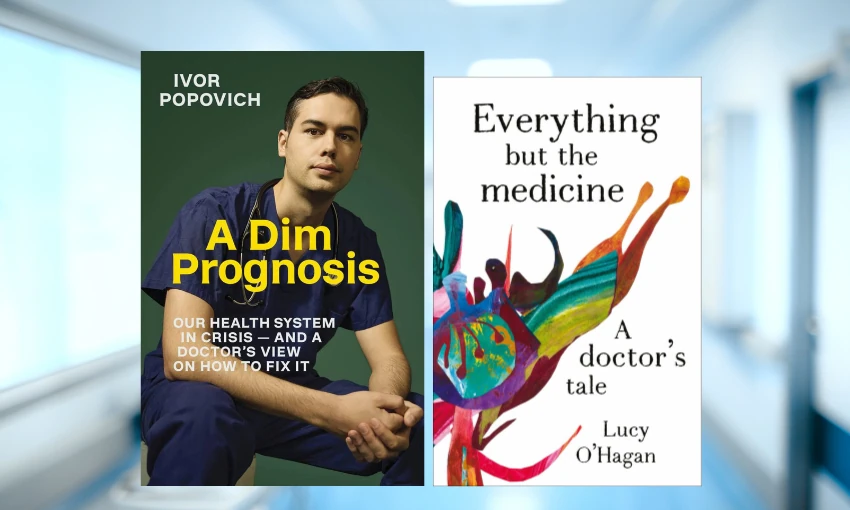Copyright thespinoff

Emma Marr, who is no stranger to the medical system, reviews A Dim Prognosis by Ivor Popovich and Everything but the Medicine: A Doctor’s Tale by Lucy O’Hagan. I recently spent a day in the ER. It was a trivial matter – a bleeding nose bad enough for my colleagues to call an ambulance, and for the carpet around my desk to resemble a crime scene – but a trip to hospital was required to make sure nothing more sinister was going on. It wasn’t, but I did spend eight hours in the ER while I waited to have that confirmed. I wish I could say it was eye-opening, but the truth is, it only revealed that the steep decline of our health system continues apace. The IT system crashed as I walked in the door, and remained offline for an hour. It came back, then crashed again. I was lucky enough to be allocated a trolley in a hallway, rather than having to wait in the waiting room, while people around me, all seeming to be significantly sicker than me, also waited for the dignity of a room with walls, or some time with a doctor. Everyone in the hospital worked as fast as they conceivably could, training for the multitasking Olympics, but the workload seemed insurmountable. This experience, along with many others over the last few years, meant I felt aligned with A Dim Prognosis by Ivor Popovich, from the title alone. Popovich’s book reveals a doctor of substantial humanity. He opens his story on the day of the Whakaari White Island eruption, which he spent treating some of the most horrifically damaged burns victims a doctor is ever likely to treat. He moves on to traverse moments of supreme mundanity – a patient who can’t poop – to enormous tragedy – a young man who dies suddenly from an unexpected heart problem. Aside from the patients, he is navigating the Kafkaesque health system, full of bullying specialists, chronic and avoidable staffing shortages, failing IT systems, targets designed to appease governments rather than improve health outcomes, pitifully inadequate budgets, and general all-round managerial incompetence. A Dim Prognosis was unputdownable for me, zipping from one tragi-comedy to another. Popovich finds humour in the darkest of circumstances, because one has to, to survive. I particularly loved his chapter about nurses, the absolute backbone of the health system. They carry out the majority of the actual care patients receive in hospital, and A Dim Prognosis is full of stories that show just how vital they are. And yet, and yet … of course, there are so many ways in which the rules they work by, and by which hospitals are staffed, go against their skills and not with them. Popovich shakes his head at the government’s insistence that there are enough nurses in New Zealand and talks about how evidence that the claims of “overstaffing” were actually just a way of saying “we don’t want to spend that much money”. It is an absolute miracle to me that people like him continue to work in our hospitals, and we should all be enormously grateful that they do. Even better, anyone with means to do so should buy his book and read it and find a way to press it into the hands of your local MP, or anyone who can have any influence whatsoever over the health budget, or the way the health service is run. It is true there will never be enough money, everyone knows that, but as Popovich explains over and over again, what money there is can be spent more efficiently, and you only need to spend an hour with any doctor working in New Zealand today to get a few ideas of how. Popovich even kindly includes a list of suggestions at the end of his book, if anyone at the Ministry of Health or Te Whatu Ora, or the Beehive, is reading. You will not be surprised to know that the same themes reappear in A Doctor’s Tale by Lucy O’Hagan. This is a gentler, slower book, almost a collection of musings and observations gathered over years of working as a general practitioner. Many of those years were spent treating the most impoverished members of our society – the most in need, the most distressed, those least able to advocate for themselves. Lucy O’Hagan describes a life spent bending the system to fit the patient, instead of the other way round. Driving a patient an hour up the coast because she had just given them bad news and they had no car to get to their family, giving a patient time to cry because he feels like a failure in life, working to learn te reo Māori to kōrero and build a stronger connection with her Māori patients. Meeting her patients where they are seems to be at the core of O’Hagan’s approach to medicine. As a baby GP she joined with two other GPs in building a medical practice from the ground up. Only after that did she build a house, and a family, and she devoted, and continues to devote, a considerable part of her life to serving the community around her. O’Hagan had known tragedy as a young adult and she was to come, like all of us, to know more tragedy. O’Hagan has extraordinary depths of empathy, and speaks of a medical practice in which she absorbs the tragedy, the crisis, the illness and the trauma around her, bears witness to it, and uses that to inform her approach to patient care. Patient, always, so very patient. Popovich and O’Hagan describe the same health system I’ve been observing for a few years. It hasn’t always been this bad. It seems to be only getting worse. Every single person I interacted with in the ER that day, like pretty much every other health professional I’ve seen up close, was working as hard as they could to help people, impeded, as Popovich and O’Hagan explain from the inside looking out, by a lack of resources, by a bureaucracy that outwardly seems to focus more about cost-saving than care, that can be so easily distracted from patient outcomes by mandated procedure, that overspends in illogical ways and causes suffering by penny pinching. Luckily for all of us, it is staffed by people like Ivor Popovich and Lucy O’Hagan. Read their books, they’re great. And while you might grind your teeth in frustration, your heart is also likely to be warmed by the knowledge that people like Ivor and Lucy are out there, looking after you and your family. They know, whatever else is going on inside those four walls of the medical establishment, that at the heart of it is the people. He aha te mea nui o te ao? He tāngata, he tāngata, he tāngata. A Dim Prognosis by Ivor Popovich (Allen & Unwin, $38) is available from Unity Books; and Everything but the Medicine: a Doctor’s Tale by Lucy O’Hagan (Massey University Press, $40) is too.



